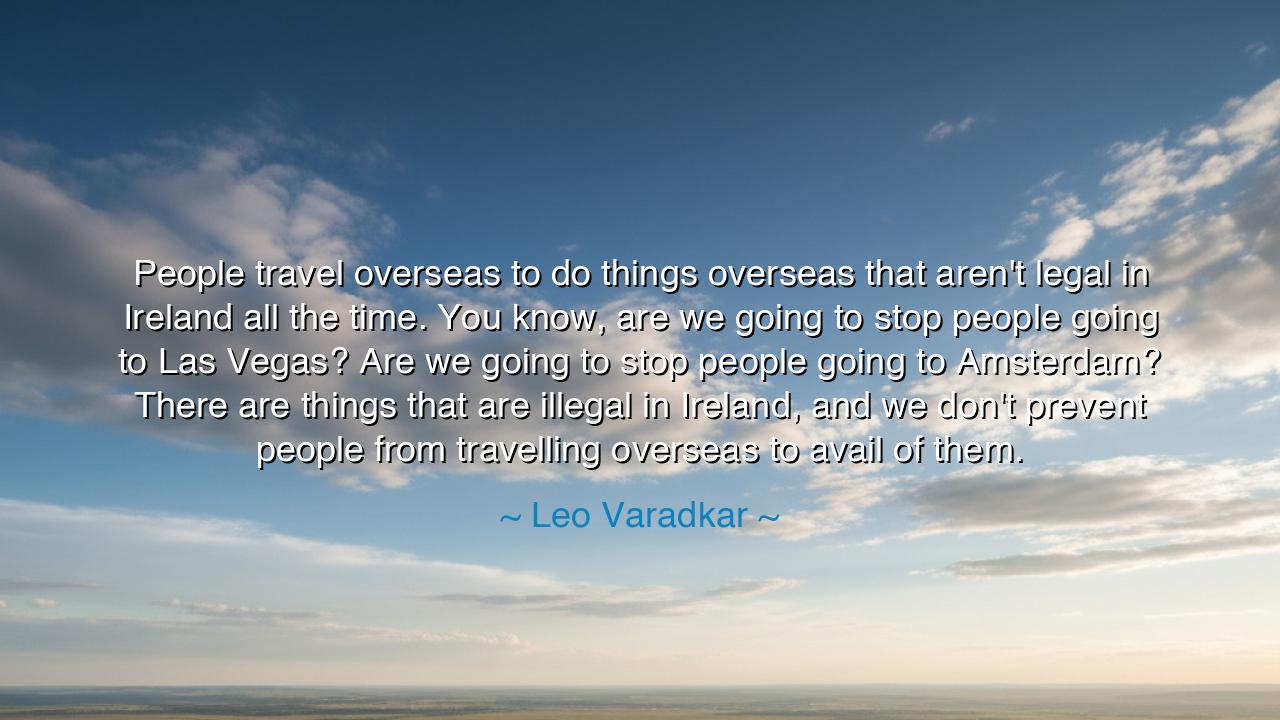
People travel overseas to do things overseas that aren't legal in
People travel overseas to do things overseas that aren't legal in Ireland all the time. You know, are we going to stop people going to Las Vegas? Are we going to stop people going to Amsterdam? There are things that are illegal in Ireland, and we don't prevent people from travelling overseas to avail of them.






The words of Leo Varadkar cut through the noise of moral debate with the sharpness of reason and the weight of truth: “People travel overseas to do things overseas that aren't legal in Ireland all the time. You know, are we going to stop people going to Las Vegas? Are we going to stop people going to Amsterdam? There are things that are illegal in Ireland, and we don't prevent people from travelling overseas to avail of them.” In these words lies not cynicism, but clarity — a recognition of the complex nature of human freedom and the limits of law’s dominion. Varadkar, in speaking of this, was not merely defending a particular policy or practice; he was touching upon the eternal tension between law and liberty, between the authority of the state and the sovereignty of the individual soul.
From the earliest ages, rulers and lawmakers have wrestled with this question: how far does the reach of the law extend? Can it bind the conscience of a person beyond the borders of their homeland? The ancients believed that law was the vessel of moral order, yet they also understood that human beings, by nature, seek freedom — and that freedom often compels them to cross boundaries both literal and symbolic. In Varadkar’s words, we hear this same age-old realization — that no government, no matter how just or powerful, can confine the human spirit within its own geography.
The origin of Varadkar’s statement lies in Ireland’s debates over personal autonomy, particularly regarding sensitive and divisive moral issues — issues like abortion, assisted reproduction, and the freedom to make personal choices that the state may restrict at home. In pointing out that people travel to places like Las Vegas or Amsterdam, where certain acts are permitted but forbidden in Ireland, Varadkar reveals the quiet hypocrisy that often hides behind moral absolutism. The law, he reminds us, cannot selectively impose virtue — for people will always find a way to live according to their own convictions. To pretend otherwise is to mistake control for morality and to confuse prohibition with righteousness.
History offers many examples of this truth. During the years of Prohibition in the United States, when the manufacture and sale of alcohol were outlawed, thousands journeyed to Canada, Mexico, and the Caribbean to drink freely. Despite the government’s moral stance, the human desire for choice prevailed. Likewise, in the ancient world, when Athens forbade certain religious practices, citizens would secretly travel to distant temples to honor the gods they loved. These journeys were not acts of rebellion alone — they were affirmations of human agency, of the belief that the soul cannot be legislated. Varadkar’s statement echoes this same principle: that law must serve humanity, not enslave it.
Yet his words also hold a deeper moral challenge. He does not argue for lawlessness, but for honesty — for the courage of societies to face the contradictions in their own values. If we allow people to seek abroad what we deny them at home, then perhaps the problem is not the traveler, but the law itself. Varadkar’s remark, though pragmatic, is rooted in compassionate realism: the understanding that a government should not wield its power as an instrument of shame or punishment against personal choice. The measure of a nation’s maturity is not how many laws it enforces, but how wisely it balances freedom with conscience.
There is a kind of ancient wisdom in recognizing that human freedom is like water — it finds its way around every barrier. Those who seek to dam it completely only invite pressure and eventual collapse. Wise rulers have always known this. Marcus Aurelius, the philosopher-emperor of Rome, wrote that the task of the state is not to crush the impulses of the people but to guide them toward virtue through reason and understanding. A just law must reflect the living reality of its citizens, not the frozen ideals of its lawmakers. This, too, is the spirit that flows through Varadkar’s words — a reminder that laws must evolve with empathy and humility, or they will erode beneath the tide of human will.
The lesson, then, is both political and deeply human. A society that seeks to control every aspect of life will lose the trust of its people. But a society that allows space for difference, that acknowledges the right to choose — even when it disagrees — will cultivate a deeper form of unity. As Leo Varadkar reminds us, true governance lies not in preventing people from seeking freedom elsewhere, but in asking why they must leave home to find it. The wise citizen, too, must reflect: do we create laws to uplift humanity, or to chain it?
So let this truth be carried forward like a torch through time: law must be the servant of liberty, not its master. No border can contain the desires of the human heart, and no decree can silence the voice of conscience. A nation that understands this will not fear its citizens’ freedom — it will embrace it as the source of its own strength. For in the end, the greatness of a people is measured not by how well it commands obedience, but by how deeply it honors the dignity of choice.






AAdministratorAdministrator
Welcome, honored guests. Please leave a comment, we will respond soon